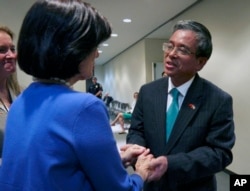Vietnam's ambassador to the United States has called on President Barack Obama to fully lift a "lethal weapons" embargo on the Southeast Asian nation.
Addressing the recent Vietnam War Summit in Austin, Texas, Ambassador Pham Quang Vinh said Obama's planned visit this month only underscores the strength of U.S.-Vietnamese relations, and that a full relaxation of the ban should reflect that level of trust.
"Today, Vietnam and the U.S. have a solid foundation for a stronger partnership," he said. "Vietnam urges the U.S. to fully lift the lethal weapons ban, [because] Vietnam believes that this element of barrier of the past should be removed to reflect our full normalization of relations started two decades ago, and the current level of our comprehensive partnership."
On the day Vinh spoke, U.S. Defense Secretary Ash Carter said in a Senate Armed Services Committee hearing that he would support lifting restrictions on the sale of weapons to Vietnam.
The U.S. partially lifted its three decade ban on lethal arms sales to Vietnam in October 2014, immediately after Foreign Minister Pham Binh Minh, who also is deputy prime minister, met with Secretary of State John Kerry in Washington.
The sudden shift in policy drew criticism from various rights groups, including New York-based Human Rights Watch, which has long protested Hanoi's treatment of opposition figures and ethnic and religious minorities.
At the time, the State Department described the move as "allowing for the future transfer of maritime security-related" military hardware to its former foe, and said that because the U.S. is aware of human rights concerns about Vietnam, all sales would be reviewed on a case-by-case basis. Vietnam has since faced increasingly aggressive Chinese territorial claims to large swaths of the resource-rich South China Sea, where Vietnamese maritime patrols have faced off against Chinese naval forces on several occasions.
Hanoi has long denied accusations from human rights organizations on media censorship and restricted Internet access, saying it does not jail dissidents, but imprisons only convicted criminals.
Kerry is expected to join the state visit by Obama, who will be the third consecutive U.S. president to make the trip.
Vinh's presence protested
Vinh's presence at the Austin summit in late April was shadowed by protests, both inside and outside the venue.
Addressing the audience, Vinh cited a number of Vietnam's recent achievements, such as expanded Internet access, to which one attendee shouted, "Stop lying." In its latest report, the Communist-ruled country was ranked 175th of 180 nations in Reporters Without Borders' World Press Freedom Index.
Unlike Kerry and former top U.S. diplomat Henry Kissinger, Vinh did not take audience questions after his speech, but left the stage as another audience member shouted, "Freedom for Vietnam!"
Outside the building, dozens of Vietnamese Americans waved flags and shouted slogans in protest of Vinh's invitation to address the summit. Bryan Chu, adviser to the Community of Vietnamese Americans in Houston, said they rallied to "protest Mr. Vinh's presence" as well as to "speak out for the struggle for democracy and human rights in Vietnam."
On the process of reconciliation between Hanoi and the Vietnamese diaspora, especially in the U.S., Chu said it is something the community "would never accept."
"We are completely against the reconciliation idea because, even inside the Communist Party in Vietnam, they do not embrace the idea," he said. "When they captured South Vietnam, they put hundreds of thousands of people in jail and made millions of people leave the country. I, myself, was a boat person who had made six unsuccessful attempts before coming to the U.S.
"Reconciliation is something we [will] never accept until the Communist Vietnamese repeals four articles in the Constitution and releases all prisoners of conscience," he added, referring to the Communist Party's constitutionally inscribed mandate to rule Vietnam.
During his address, Vinh said Vietnamese and U.S. officials have been discussing "remaining differences like human rights."
On April 27, Kerry said Washington and Hanoi will "continue to have differences in opinions, but the good news is that both sides are regularly exchanging ideas, outspokenly and effectively on those differences."
This report was produced in collaboration with VOA's Vietnamese service.





